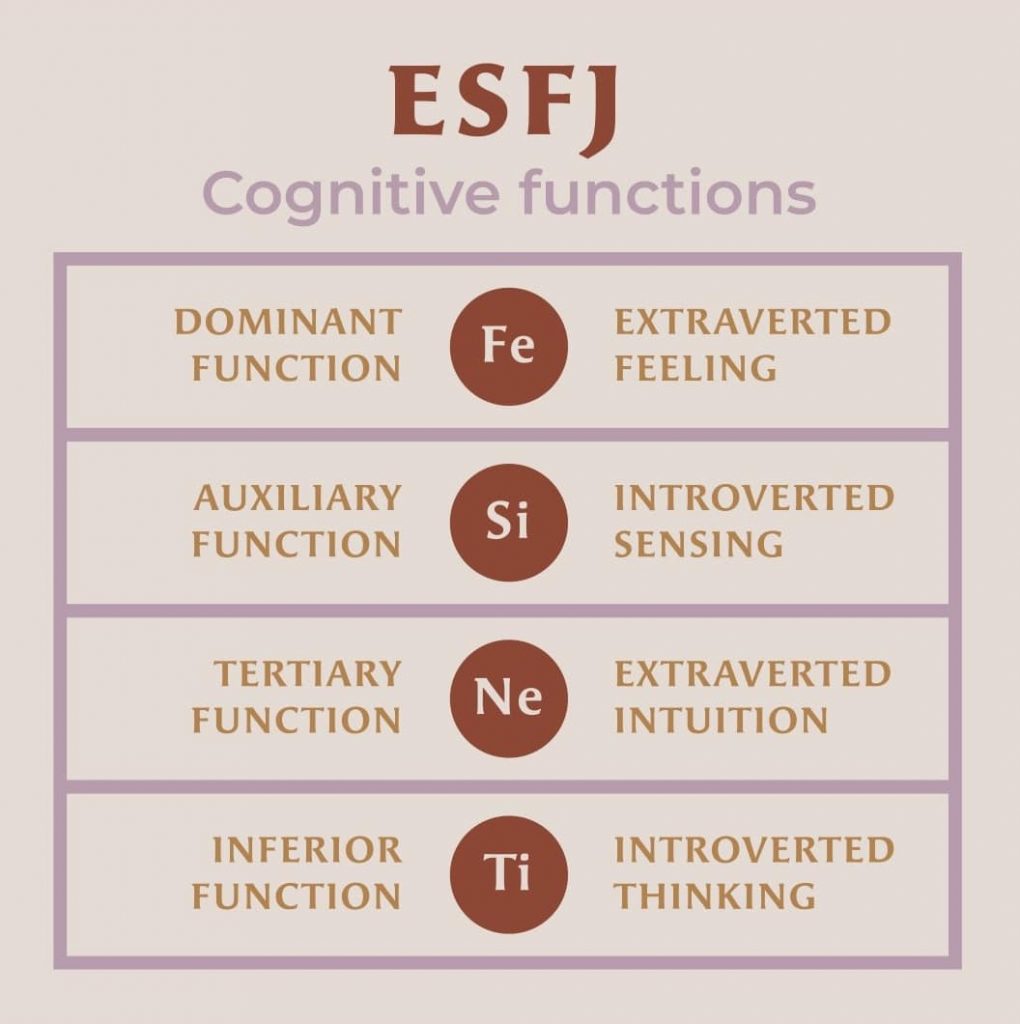ESFJ – The Consul
Contents
ESFJ Meaning:
The ESFJ personality type consists of the following traits, Extravert, in that they energize by interacting with the others and the outside world, Sensing, in that they learn and interact with the world primarily through what they can sense and experience firsthand, Feeling, in that they often consider emotions and thoughts of others in their decisions and reasoning, and Judging, in that they prefer a logical, particular orderliness in both their personal and professional lives. Other names for the ESFJ include the Provider, the Caregiver, The Seller, the Host, and the Facilitator. ESFJs are among the most common personality types, with twelve percent of the general population reporting in as ESFJ, with a staggering 17 percent of all women reporting in as an ESFJ, compared to a (still fairly common) 8 percent of men.
ESFJs are predominantly for the people. They seek to create and maintain harmony and unity in the world, society, and their communities. They are exceptionally social and gregarious, truly thriving on interacting with all types of people. ENFJs tend to have a multitude of relationships given their preference for Extraversion. ENFJs are usually incredibly involved in their communities and have a profound appreciation for the thoughts and feelings of others.
Given their Judging tendency, they often have lead very scheduled, routine, and orderly lives at home and within their relationships. They value and cherish structure and have a deep respect and recognition for rules and authority.

ESFJ and Career:
ESFJs are most comfortable in work environments that involve meeting and interacting with people, but, most of all, helping and organizing people. They are highly empathetic and generous and take a great pride and satisfaction in supporting and developing people in practical ways.
ESFJs also prefer a structured and organized work environment. They very much like a workplace that has established and enforced rules, processes, and procedures. ESFJs appreciate a work environment with a culture of collaboration and cooperation and a strong team dynamic.
ESFJ as Direct Reports:
As direct reports, ESFJs prefer clear and explicit tasks and directions within a larger framework of defined and unambiguous rules, processes, and procedures. They will often include the opinions and thoughts of other team members to inform their direction and will also offer their ow opinion and ideas as much as possible as well.
ESFJs tend not to enjoy conflict, as this signals a disruption in the balance and harmony that makes them feel most at ease. ESFJs, therefore, tend to avoid disagreement through careful discretion. ESFJs are not – particularly competitive, unless it is for a noble cause, or a matter of team building and bonding.
ESFJs also enjoy a daily routine and predictable ways of doing things. They naturally prefer a set schedule and a workplace free of constant surprises and changes. This is not to say that they are averse to change, but, instead, they are accepting and embracing of change when it is introduced and executed in a structured, organized, and layered way.
ESFJ as Leaders of Others:
As leaders of others, ESFJs create strong connections and bonds of trust with their direct reports. They tend to lead by gaining the respect and confidence of their team and by being able to establish overall positive relationships with everyone, regardless of background or personality type.
ESFJs build this respect and trust by often jumping in and assisting with any given task at hand and genuinely enjoys taking part in the front-line comradery and team dynamic. They tend to be extremely hard working with an impressively strong work ethic.
ESFJs are also very much goal-oriented, and will garner buy-in and rally the team by cascading and communicating the goals in a ‘we are all in this together’ type of mindset. However, although goal-oriented, the ESFJ does tend to struggle with conflict, and this may pose a problem when they are put in a position where they must be ‘a boss’ and not the ‘leader of the people. As such, they will tend to avoid conflict and difficult conversations as much as possible, which, if not kept in check, can lead to an imbalance of power between the ESFJ and the rest of the team. This will eventually have a ripple effect that can bring down the the team’s performance, morale, and may result in the team calling the ESFJ’s authority into question.
ESSFJ Professions:
Given their natural preferences, ESFJs tend to be most comfortable in careers and professions that involve interacting and helping others. These have a wide range of applications and professional fields.
With their Judging tendency, they enjoy creating and maintaining order and harmony, especially when it involves others. This disposition makes them strong contenders for the following professions, including Administrative Assistant, Paralegal, Court Reporter, Hotel Manager, Event Coordinator, Receptionist, and Dental Assistant.
Also, given their altruism and their people-first attitude, they are also quite well suited for Law Enforcement and Community Care professions, such as Security Guard, Police Officer, Social Worker, Child Care Provider, Peace Officer, as well as Lawyer. Unsurprisingly, ENFJs also make for remarkably effective medical practitioners such as Nurses, Doctors, and Therapists.
In a corporate environment, ENFJs have the makeup to be extraordinarily practical and renowned Human Resources Managers, Corporate Trainers, as well as Public Relations Managers.
It is apparent that ESFJs have a healthy selection of possible professions and career paths that appeal to their natural tendencies; however, there are some that the ESFJ may want to strongly consider before entering or avoid entirely. ESFJs tend to perform their best and find the most satisfaction when interacting and dealing with people, given their Extravert preference. As such, ESFJs should be careful when considering the professions of Developer, Farmer, Economist, Computer Science, and Engineering.
ESFJ and Interpersonal Relationships:
ESFJs make for loyal, dedicated, and nurturing friends and lovers. They seek out those that share their same practicality and passion for helping others and creating harmony and order in the world around them. They exude a brilliant and genuine sense of compassion and care, and this temperament is ideal for some, while others may find it unnecessary or slightly exaggerated.

ESFJ in Friendships:
ESFJs work best with those personality types that share their same interests and values. They appreciate when they can share their passion for helping others, and those who are as structured and organized as themselves. These mainly include other Sensing, Feeling and Judging personality types, such as the ISFJ (Introvert, Sensing, Feeling, Judging), the ESTJ (Extravert, Sensing, Thinking, Judging), the ESFP (Extravert, Sensing, Feeling, Perceiving), and, of course, fellow ESFJs.
And, although all personality types have the potential and capacity to have profound and lasting relationships, there are some that some may be more challenging than others, primarily due to fundamental differences in perspective, values, approach, and understanding. For the ESFJ, the potentially most challenging personality types would include those who are primarily Intuitive and Perceiving, and can consist of, the INTP (Introvert, Intuitive, Thinking and Perceiving), the INTJ (Introvert, Intuitive, Thinking and Judging), the INFP (Introvert, Intuitive, Feeling and Perceiving), and the ENTP (Extraverted, Intuitive, Thinking, and Perceiving).
ESFJ in Romantic Relationships:
ESFJs work best with a partner who appreciates and respects their affinity for keeping all things organized, structured, and metered. This is not to say that ESFJs do not enjoy spontaneity within the relationship and on the part of their partner. However, too much without any proper consistency and planning can become a point of contention for the ESFJ. ESFJs are deeply caring and compassionate partners who embrace the role of supporter and nurturer in the relationship. ESFJs place exceptionally high importance on boundaries and rules within the relationship. A significant point of contention for ENFJs is any overstepping of these boundaries or breaking of the established rules.
While an ESFJ can appreciate and enjoy applying order and organization for others, including their partner, if it is not appreciated or maintained, it can be potentially frustrating for the ESFJ.
Given that ESFJs are also averse to conflict, they work well with personality types that can navigate disagreements or conflicting points of view that show particular respect and recognition of their Feeling and Sensing traits. This is key to maintaining the harmony and balance that ESFJs appeal to fundamentally, and indeed requires a high degree of empathy and communication from both sides.
ESFJ and Families:
ESFJs have a natural aptitude and affinity for being amazing and influential parents, especially in the traditional sense. They excel and thrive in devoting and pouring their energy and love into their children, ensuring that they are taken care of in every aspect of the word.
It is also within ESFJs nature to establish well-defined rules and boundaries for their children, all with the best intentions and with the general well-being and success of the children and family in mind.
ESFJs take great joy and personal pride in watching their children grow and succeed, and this approach is commonly adopted by their children as well, making for long generations of caregivers. ESFJs, however, also run the risk of being too gentle and accommodating in their parent-child relationships. As they want balance and harmony above all else, the ESFJ as a parent may avoid uncomfortable conversations or shirk the responsibility of discipline onto their partner.
Conclusion:
As such, it becomes quickly evident why the ESFJ personality type is commonly labeled as the Caregiver and the Provider. They have a warm and generous nature about them and seek and develop the best in other people.
In a work environment, they make for both influential leaders and direct reports in that they are highly collaborative and have a strong sense of team pride and spirit. They lead with respect and do not hesitate to work right alongside the team, regardless of the task.
They love and appreciate structure and order in all things, given their Judging tendency. This makes for highly efficient and productive work styles and relationships. However, any deviation from this order can be a significant cause of stress for the ESFJ.
ESFJs thrive and excel in helping and taking care of others. As such, they are common in the medical industry as well as Social work. ESFJs are also highly social and have many interpersonal relationships and connections. They gravitate toward others who share their same passions for altruism and philanthropy. ESFJs also place a high value on rules and boundaries and get along best with those who respect and value the same.
As ESFJs are conflict-averse and prefer not to rock the boat, they may run the risk of censoring themselves, or being overly conscientious, even when they have been blatantly or explicitly slighted or wronged. This leaves them open for the opportunity to have their good nature taken advantage of. They should be particularly mindful to ensure they take care of themselves as much as they take care of others.
Lastly, given the ENFJs values and preferences, it is unsurprising that they thrive in a family unit. They are dedicated, loyal, nurturing, and compassionate parents and partners. They bring order, joy, and care to all of those around them and take great pride in the success of their family.
You can find information on famous people with ESFJ personality types such as celebrity actors, sportsmen, characters and other historical characters with this personality type.







